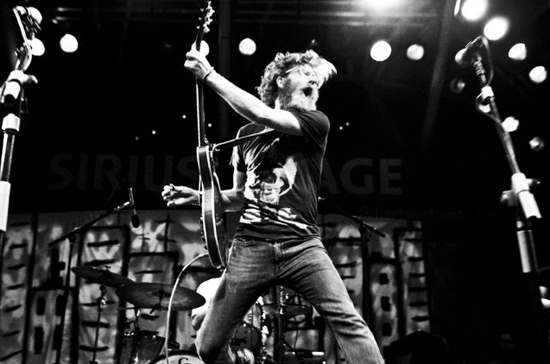Taqwacore: The Birth of Punk Islam
As the sun sets on downtown Austin, America’s biggest freak-show street party is just starting to warm up. It may be the Texan state capital, but this compact college town is not George Bush’s Texas. Fabled for its live rock scene and its boho-slacker lifestyle, Austin is a grungy melting pot of musicians, artists, outlaws and eco-hippies. The unofficial local motto? Keep Austin Weird. Respect.
Every March, most of America’s bad-ass biker punks, acid rockers, disco hooligans, jiggy-crunk rappers and wonky-bearded indie shamblers descend on Austin for South By Southwest, a music industry conference with more than 1000 live gigs attached. Last week’s all-you-can-eat buffet of Texan hospitality included everyone from Smokey Robinson to Roky Erickson, Motorhead to Muse, Snoop Dogg to Courtney Love, plus hundreds of potential Next Big Things.
Launched in 1987, SXSW is now an annual spring fixture for thousands of bands and music industry professionals around the world, including a fairly sizeable British invasion. Less well known is its excellent film festival, running parallel with the music conference, which leans heavily towards first-time directors and musical subjects. But your Quietus correspondent was there last week, slipping into Austin’s lovely old Art Deco cinemas in between tequila slammer sessions with Roky and Smokey. Here we present the best of the fest – the good, the bad and the plain weird…
Lemmy: The Movie
Warts and all, the artist formerly known as Ian Fraser Kilmister finally gets the deluxe bio-doc treatment. The gushing tributes to the grizzled Motorhead frontman from Lars Ulrich, Slash, Dave Grohl and the usual suspects are mostly inessential filler, but co-directors Greg Olliver and Wes Orshiski dig out some interesting background material, including archive clips of Lemmy’s teenage beat group The Rockin’ Vickers and some revealing exchanges with his grown-up son Paul. Exiled to a clutter-filled apartment in LA, the Mark E. Smith of Britmetal comes across as essentially likeable and irredeemably English, the heavy rock equivalent of a retired roofing contractor from Rochdale eking out his autumn years in the Marbella sun.

Ride, Rise, Roar
David Byrne’s 2008-9 world tour, showcasing his career-spanning songbook of Brian Eno collaborations, was one of the pop polymath’s most successful and theatrical live ventures since his Talking Heads heyday. A song-and-dance spectacular performed in pristine white uniforms, it demanded to be preserved on film. Directed by David Hillman Curtis, this is a handsome albeit conventional record of the tour, from rehearsals and choreography meetings to lavishly shot live performances. Byrne is on grand form, his nervous tics mellowing with age, his once-reedy voice now rich and creamy. For fans only, perhaps, but a fine record of a great show, and probably the closest the post-Heads Byrne has yet come to recreating the artful poise of his classic concert documentary Stop Making Sense.
The Runaways
After years of honing her visuals skills on stylishly creepy goth-grunge videos for the likes of Marilyn Manson, David Bowie, The White Stripes and Sigur Ros, the Italian-born director Floria Sigismondi makes her feature debut with this fairly straight rise-and-fall biopic of LA’s late 1970s jailbait grrrl-rockers The Runaways. The script was adapted from a confessional memoir by the band’s main singer Cherrie Curry (played by Dakota Fanning) with approval from her former bandmate Joan Jett (played by Twilight star Kristen Stewart). The narrative follows a grindingly familiar arc, from teenage talent shows to bisexual bed-hopping, druggy excess, soured friendships and inevitable split. All the same, Sigismondi spices these overly simplistic ingredients with cool visual flourishes and strong performances, notably Michael Sheehan’s movie-stealing comic turn as sleazy Sunset Strip svengali Kim Fowley.
Strange Powers: Stephin Merritt and the Magnetic Fields
Merritt is rightly celebrated for his droll lyrics and arch chamber-pop, but he hardly makes a comfortable documentary subject. This respectful portrait by co-directors Kerthy Fix and Gail O’Hara is peppered with dry one-liners and tributes from famous fans including Peter Gabriel, comedian Sara Silverman and Lemony Snicket author Daniel Handler. Merritt’s crucial relationship with Magnetic Fields manager and longtime musical collaborator Claudia Gonson is gently unpicked, but he never quite drops his defensive wall of urbane irony. For all its waspish wit and faux intimacy, the film suffers from a distinct lack of drama. The most prickly revelation the directors can muster is a handbags-at-dawn spat with New Yorker critic Sasha Frere-Jones, who once deconstructed Merritt’s music taste as suspiciously white, only to change his mind. Still, there are enough eyebrow-raising morsels here for Fields fans.
The Taqwacores / Taqwacore: The Birth of Punk Islam
Two films inspired by the loosely defined but energetic ‘Muslim punk’ subculture which has grown up in North America around Michael Muhammad Knight’s cult novel, The Taqwacores. Eyad Zahra’s dramatic adaptation of the book is an engaging but fairly conventional rites-of-passage indie movie, small but sweet. Much more impressive is Omar Majeed’s documentary Taqwacore: The Birth of Punk Islam, a moving and fascinating look inside this budding scene and the charismatic, conflicted characters behind it. Knight himself is the real star, the son of a white supremacist who converted to a strict form of Islam in his teens, but now preaches religion as a form of punk self-expression. Majeed’s film also follows leading Taqwacore band the Kominas to Pakistan, where their attitudes to freedom of speech, gender and class are tested to the limit.
Strummerville
Directed by veteran punk chronicler Don Letts, this hour-long documentary is essentially a promo film for the music charity set up in Joe Strummer’s memory. Splicing archive footage of the iconic Clash frontman with memories from famous friends and new music by young artists who have benefited from the Strummerville scheme, Letts pays fond homage to the late singer’s passionate, egalitarian, idealistic nature. Too much time is given over to reverential, repetitive tributes from Strummerville patron Damien Hirst and others, but the Utopian spirit of the project is hard to fault. Coming to a TV near you soon.

This Movie Is Broken
When Canadian folk-pop collective Broken Social Scene played a landmark hometown show in Toronto last July, director Bruce McDonald was there with cameras. He then spliced the live footage into a loose dramatic narrative about a young couple who attend the gig, fall out, make up, then share a faintly bizarre bisexual episode. In principle, this is a sweet bohemian fable filmed in lush, sun-dappled colours. But in practice, the whimsical plot feels as jarringly false as the fictional duo’s gooey-eyed worship of BSS. By the end, I hated both the characters and the band, whose sub-Coldplay anthems of decaffeinated, wispy-bearded, mild-mannered euphoria all began to sound insufferably smug. But hell, don’t take my word for it. You’ll probably love it.



